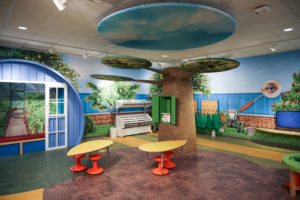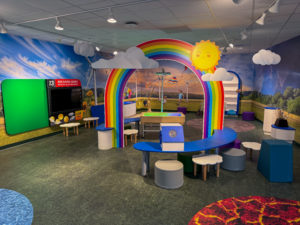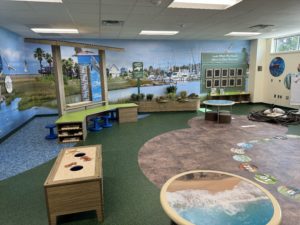After years of consideration, months of planning, weeks of emails, days of meetings, and endless hours of lost sleep, your district has finally made experiential classrooms a reality!
But what comes next?
Supporting educators as they transition to teaching in an experiential learning environment is imperative. A new teaching and learning environment is exciting but can also be intimidating and overwhelming for both teachers and students alike. But the Exploration Zones by Exhibit Concepts® team provides the tools, best practices, and encouragement necessary to make the transition exciting and impactful. Working alongside exhibit and structural designers, our educational support begins with an understanding of student, educator, and district needs.
At Exploration Zones, it all starts with the educational support committee. This committee includes representatives from various stakeholders in the school district as well as subject matter experts from Exploration Zones.
The first order of business for the education support committee is a discovery meeting. During the discovery meeting, the team discusses project goals and objectives, educational theories, state standards and any other pertinent district needs. This educational support committee continues to meet consistently and regularly throughout the project.
Support may look different for each school district based on unique contexts and needs. However, common forms of school district support include:
- Educational Support Committee: a team comprised of district stakeholders and Exploration Zones team members. The educational support committee creates project goals and objectives, determines direction of educator guides, and provides developmentally appropriate feedback around classroom design and materials.
- Educator Guides: supportive tools that can include lesson plans, activity ideas, assessment tools, and other teaching strategy suggestions. Educator guides are theme-based and developed with district input.
- Curated Materials: developmentally appropriate classroom materials that are intentionally aligned with early learning standards and educator guide lesson plans and activity ideas. These materials do not take the place of established curriculum, but rather work alongside it.
- Educator Training: a professional development day targeted to set teachers and paraprofessionals up for success. Educator training aims to introduce educators to experiential learning concepts and walks educators through the fixtures and features of the classrooms.
- Educator Focus Groups: a group of intentionally selected teachers and paraprofessionals participating in a group interview. Participants are provided the opportunity to share suggestions and challenges to improve design and educational offerings.
- Community of Practice Building (separate price point/add on): a long-term series of conversations, workshops, and reflection centered on building capacity and understanding around experiential learning. Educators receive year-long support and Exploration Zones guidance building a community of practice, helping educators become reflective practitioners, setting personal goals, trying out new strategies, and discussing successes and challenges before engaging students in experiential learning classrooms.
Exploration Zones by Exhibit Concepts® is the only design-build firm that offers full educational support and classroom resources that are unique to each themed learning environment. Quality early education sets the stage for a lifelong love of learning and it’s our vision to be innovators in the field and to continue to provide cutting-edge spaces for young learners.
Want to learn more about our experiential education environments? Connect with us today!



